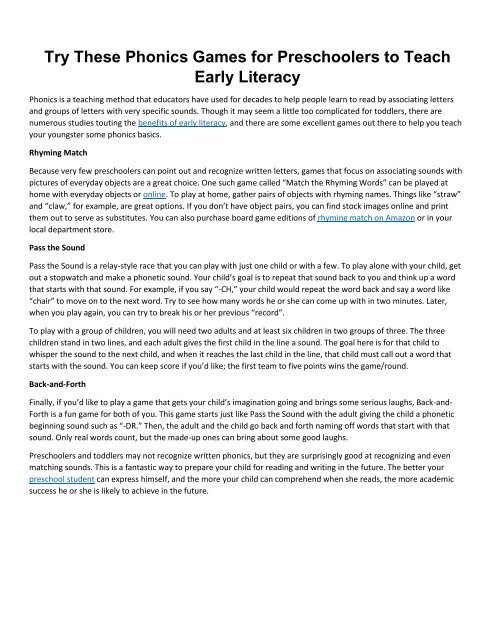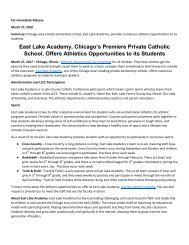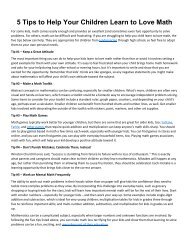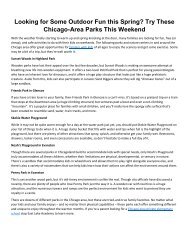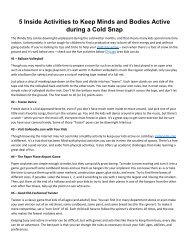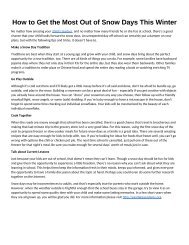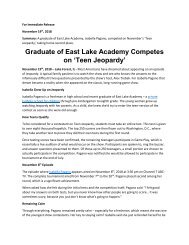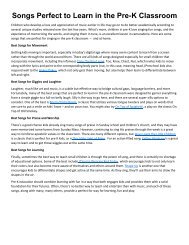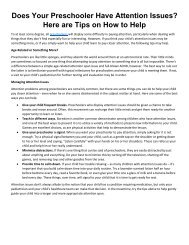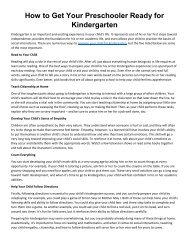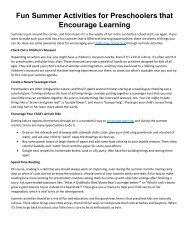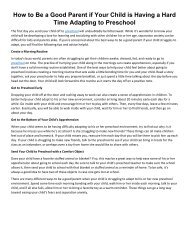Try These Phonics Games for Preschoolers to Teach Early Literacy
Phonics is a teaching method that educators have used for decades to help people learn to read by associating letters and groups of letters with very specific sounds. Visit: http://eastlakeacademy.org
Phonics is a teaching method that educators have used for decades to help people learn to read by associating letters and groups of letters with very specific sounds. Visit: http://eastlakeacademy.org
- TAGS
- phonics
- preschoolers
- literacy
Create successful ePaper yourself
Turn your PDF publications into a flip-book with our unique Google optimized e-Paper software.
<strong>Try</strong> <strong>These</strong> <strong>Phonics</strong> <strong>Games</strong> <strong>for</strong> <strong>Preschoolers</strong> <strong>to</strong> <strong>Teach</strong><br />
<strong>Early</strong> <strong>Literacy</strong><br />
<strong>Phonics</strong> is a teaching method that educa<strong>to</strong>rs have used <strong>for</strong> decades <strong>to</strong> help people learn <strong>to</strong> read by associating letters<br />
and groups of letters with very specific sounds. Though it may seem a little <strong>to</strong>o complicated <strong>for</strong> <strong>to</strong>ddlers, there are<br />
numerous studies <strong>to</strong>uting the benefits of early literacy, and there are some excellent games out there <strong>to</strong> help you teach<br />
your youngster some phonics basics.<br />
Rhyming Match<br />
Because very few preschoolers can point out and recognize written letters, games that focus on associating sounds with<br />
pictures of everyday objects are a great choice. One such game called “Match the Rhyming Words” can be played at<br />
home with everyday objects or online. To play at home, gather pairs of objects with rhyming names. Things like “straw”<br />
and “claw,” <strong>for</strong> example, are great options. If you don’t have object pairs, you can find s<strong>to</strong>ck images online and print<br />
them out <strong>to</strong> serve as substitutes. You can also purchase board game editions of rhyming match on Amazon or in your<br />
local department s<strong>to</strong>re.<br />
Pass the Sound<br />
Pass the Sound is a relay-style race that you can play with just one child or with a few. To play alone with your child, get<br />
out a s<strong>to</strong>pwatch and make a phonetic sound. Your child’s goal is <strong>to</strong> repeat that sound back <strong>to</strong> you and think up a word<br />
that starts with that sound. For example, if you say “-CH,” your child would repeat the word back and say a word like<br />
“chair” <strong>to</strong> move on <strong>to</strong> the next word. <strong>Try</strong> <strong>to</strong> see how many words he or she can come up with in two minutes. Later,<br />
when you play again, you can try <strong>to</strong> break his or her previous “record”.<br />
To play with a group of children, you will need two adults and at least six children in two groups of three. The three<br />
children stand in two lines, and each adult gives the first child in the line a sound. The goal here is <strong>for</strong> that child <strong>to</strong><br />
whisper the sound <strong>to</strong> the next child, and when it reaches the last child in the line, that child must call out a word that<br />
starts with the sound. You can keep score if you’d like; the first team <strong>to</strong> five points wins the game/round.<br />
Back-and-Forth<br />
Finally, if you’d like <strong>to</strong> play a game that gets your child’s imagination going and brings some serious laughs, Back-and-<br />
Forth is a fun game <strong>for</strong> both of you. This game starts just like Pass the Sound with the adult giving the child a phonetic<br />
beginning sound such as “-DR.” Then, the adult and the child go back and <strong>for</strong>th naming off words that start with that<br />
sound. Only real words count, but the made-up ones can bring about some good laughs.<br />
<strong>Preschoolers</strong> and <strong>to</strong>ddlers may not recognize written phonics, but they are surprisingly good at recognizing and even<br />
matching sounds. This is a fantastic way <strong>to</strong> prepare your child <strong>for</strong> reading and writing in the future. The better your<br />
preschool student can express himself, and the more your child can comprehend when she reads, the more academic<br />
success he or she is likely <strong>to</strong> achieve in the future.


